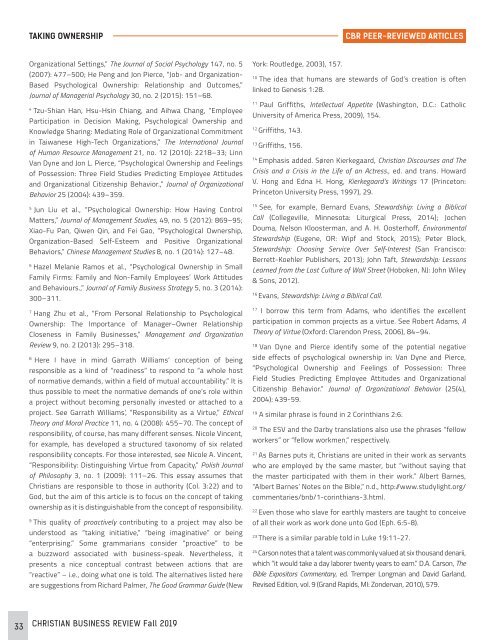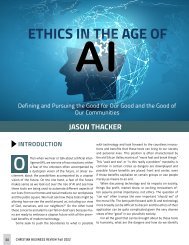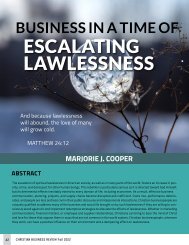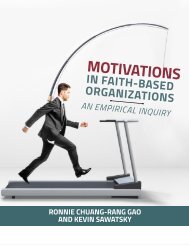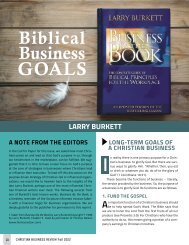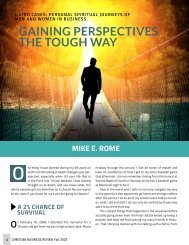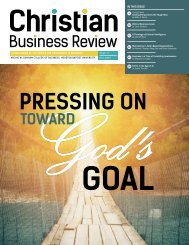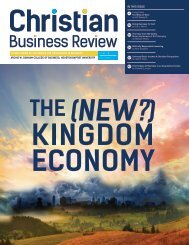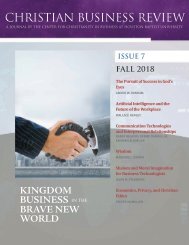Christian Business Review 2019: Workplace Practices That Glorify God (Issue 8)
Create successful ePaper yourself
Turn your PDF publications into a flip-book with our unique Google optimized e-Paper software.
TAKING OWNERSHIP<br />
CBR PEER-REVIEWED ARTICLES<br />
Organizational Settings,” The Journal of Social Psychology 147, no. 5<br />
(2007): 477–500; He Peng and Jon Pierce, “Job- and Organization-<br />
Based Psychological Ownership: Relationship and Outcomes,”<br />
Journal of Managerial Psychology 30, no. 2 (2015): 151–68.<br />
4<br />
Tzu-Shian Han, Hsu-Hsin Chiang, and Aihwa Chang, “Employee<br />
Participation in Decision Making, Psychological Ownership and<br />
Knowledge Sharing: Mediating Role of Organizational Commitment<br />
in Taiwanese High-Tech Organizations,” The International Journal<br />
of Human Resource Management 21, no. 12 (2010): 2218–33; Linn<br />
Van Dyne and Jon L. Pierce, “Psychological Ownership and Feelings<br />
of Possession: Three Field Studies Predicting Employee Attitudes<br />
and Organizational Citizenship Behavior.,” Journal of Organizational<br />
Behavior 25 (2004): 439–359.<br />
5<br />
Jun Liu et al., “Psychological Ownership: How Having Control<br />
Matters,” Journal of Management Studies, 49, no. 5 (2012): 869–95;<br />
Xiao-Fu Pan, Qiwen Qin, and Fei Gao, “Psychological Ownership,<br />
Organization-Based Self-Esteem and Positive Organizational<br />
Behaviors,” Chinese Management Studies 8, no. 1 (2014): 127–48.<br />
6<br />
Hazel Melanie Ramos et al., “Psychological Ownership in Small<br />
Family Firms: Family and Non-Family Employees’ Work Attitudes<br />
and Behaviours.,” Journal of Family <strong>Business</strong> Strategy 5, no. 3 (2014):<br />
300–311.<br />
7<br />
Hang Zhu et al., “From Personal Relationship to Psychological<br />
Ownership: The Importance of Manager–Owner Relationship<br />
Closeness in Family <strong>Business</strong>es,” Management and Organization<br />
<strong>Review</strong> 9, no. 2 (2013): 295–318.<br />
8<br />
Here I have in mind Garrath Williams’ conception of being<br />
responsible as a kind of “readiness” to respond to “a whole host<br />
of normative demands, within a field of mutual accountability.” It is<br />
thus possible to meet the normative demands of one’s role within<br />
a project without becoming personally invested or attached to a<br />
project. See Garrath Williams’, “Responsibility as a Virtue,” Ethical<br />
Theory and Moral Practice 11, no. 4 (2008): 455–70. The concept of<br />
responsibility, of course, has many different senses. Nicole Vincent,<br />
for example, has developed a structured taxonomy of six related<br />
responsibility concepts. For those interested, see Nicole A. Vincent,<br />
“Responsibility: Distinguishing Virtue from Capacity,” Polish Journal<br />
of Philosophy 3, no. 1 (2009): 111–26. This essay assumes that<br />
<strong>Christian</strong>s are responsible to those in authority (Col. 3:22) and to<br />
<strong>God</strong>, but the aim of this article is to focus on the concept of taking<br />
ownership as it is distinguishable from the concept of responsibility.<br />
9<br />
This quality of proactively contributing to a project may also be<br />
understood as “taking initiative,” “being imaginative” or being<br />
“enterprising.” Some grammarians consider “proactive” to be<br />
a buzzword associated with business-speak. Nevertheless, it<br />
presents a nice conceptual contrast between actions that are<br />
“reactive” – i.e., doing what one is told. The alternatives listed here<br />
are suggestions from Richard Palmer, The Good Grammar Guide (New<br />
York: Routledge, 2003), 157.<br />
10<br />
The idea that humans are stewards of <strong>God</strong>’s creation is often<br />
linked to Genesis 1:28.<br />
11<br />
Paul Griffiths, Intellectual Appetite (Washington, D.C.: Catholic<br />
University of America Press, 2009), 154.<br />
12<br />
Griffiths, 143.<br />
13<br />
Griffiths, 156.<br />
14<br />
Emphasis added. Søren Kierkegaard, <strong>Christian</strong> Discourses and The<br />
Crisis and a Crisis in the Life of an Actress., ed. and trans. Howard<br />
V. Hong and Edna H. Hong, Kierkegaard’s Writings 17 (Princeton:<br />
Princeton University Press, 1997), 29.<br />
15<br />
See, for example, Bernard Evans, Stewardship: Living a Biblical<br />
Call (Collegeville, Minnesota: Liturgical Press, 2014); Jochen<br />
Douma, Nelson Kloosterman, and A. H. Oosterhoff, Environmental<br />
Stewardship (Eugene, OR: Wipf and Stock, 2015); Peter Block,<br />
Stewardship: Choosing Service Over Self-Interest (San Francisco:<br />
Berrett-Koehler Publishers, 2013); John Taft, Stewardship: Lessons<br />
Learned from the Lost Culture of Wall Street (Hoboken, NJ: John Wiley<br />
& Sons, 2012).<br />
16<br />
Evans, Stewardship: Living a Biblical Call.<br />
17<br />
I borrow this term from Adams, who identifies the excellent<br />
participation in common projects as a virtue. See Robert Adams, A<br />
Theory of Virtue (Oxford: Clarendon Press, 2006), 84–94.<br />
18<br />
Van Dyne and Pierce identify some of the potential negative<br />
side effects of psychological ownership in: Van Dyne and Pierce,<br />
“Psychological Ownership and Feelings of Possession: Three<br />
Field Studies Predicting Employee Attitudes and Organizational<br />
Citizenship Behavior.” Journal of Organizational Behavior (25(4),<br />
2004): 439-59.<br />
19<br />
A similar phrase is found in 2 Corinthians 2:6.<br />
20<br />
The ESV and the Darby translations also use the phrases “fellow<br />
workers” or “fellow workmen,” respectively.<br />
21<br />
As Barnes puts it, <strong>Christian</strong>s are united in their work as servants<br />
who are employed by the same master, but “without saying that<br />
the master participated with them in their work.” Albert Barnes,<br />
“Albert Barnes’ Notes on the Bible,” n.d., http: /www.studylight.org/<br />
commentaries/bnb/1-corinthians-3.html.<br />
22<br />
Even those who slave for earthly masters are taught to conceive<br />
of all their work as work done unto <strong>God</strong> (Eph. 6:5-8).<br />
23<br />
There is a similar parable told in Luke 19:11-27.<br />
24<br />
Carson notes that a talent was commonly valued at six thousand denarii,<br />
which “it would take a day laborer twenty years to earn.” D.A. Carson, The<br />
Bible Expositors Commentary, ed. Tremper Longman and David Garland,<br />
Revised Edition, vol. 9 (Grand Rapids, MI: Zondervan, 2010), 579.<br />
33<br />
CHRISTIAN BUSINESS REVIEW Fall <strong>2019</strong>


